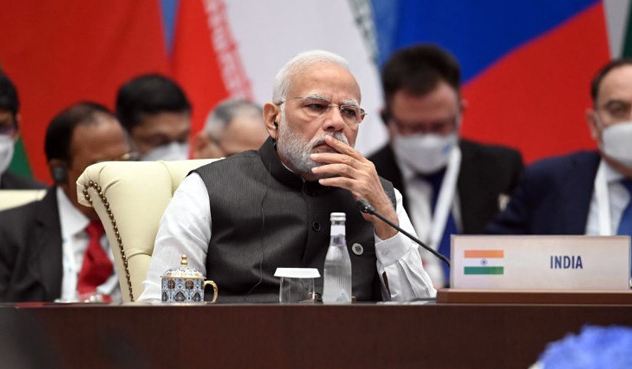India’s irresponsible move to virtually hold 22nd SCO summit undermines regional cooperation
Nayeem Maqbool
India dropped the plan to host 22nd SCO summit in Delhi and decided to host it in virtual format on 4 July 2023, despite its maiden chairmanship of the SCO summit which was a great opportunity for India to discuss bilateral issues in person with fellow SCO member states and ease out tensions. It is not the first time India has demonstrated itself as an irresponsible member of the international community. Theinternational community has witnessed India’s habitual irresponsible attitude, evenin the last month when they hosted3rd tourism meeting of G20 in the disputed territory of Jammu and Kashmir.
The meeting in the disputed territory exposed India’s pettiness and arrogance against the populace of the internationally recognized disputed territory. The hosting of G20 meeting in disputed territory was in total disregard to the UN Security Council resolutions, bilateral agreements and the violation of the principles of the UN Charter and international law. The move was criticized by many states including China and three G20 member states didn’t participate in the meeting. China has been serious about the regional security and stability and expressed serious concern towards India’s irresponsible move. China considers such steps and activities as complications to the situation in the region and considers it the need of the time to make serious efforts to settle the differences through dialogue and consultation to maintain peace and stability in South Asia.
During the regular meeting of the SCO Foreign Ministers Council that took place on 4 and 5 May, 2023, in Goa, India,the foreign minister of India while responding to media gave unsubstantiated statements and made allegations and insinuations on Pakistan of helping terrorists to infiltrate into India.The allegationswere denied by his Pakistani counterpart who claimed that these are totally baseless and unfounded and definitely such unsubstantiated statements are not helpful in creating a conducive environment necessary for improving the bilateral relationships.
Earlier, ahead of the SCO foreign ministers’meeting, India announced not to hold any bilateral meetings on the sidelines of the SCO meetingwith Pakistan that was also a bad gesture for bilateral relationship as well as for the peace and security in the region. Althoughsuch type of bilateral meetings play an important role to make a way for peaceful and meaningful talks but heads and foreign ministers of both the countries have lastmet in Russia during the SCO summit in 2015.
India, instead of contributing to cope with regional threats and challenges and to resolve international differences through dialogue and consultation has repeatedly shown irresponsible behavior, particularly the strained relationship with the SCO member states China and Pakistan.India wants to assertits status and influence in the region and try to play a hegemonic role in the region which also caters the interests of US.
China is ready to push the alignment of the Belt and Road Initiative (BRI) with the development strategies of Afghanistan, to support the extension of the China-Pakistan Economic Corridor (CPEC) to Afghanistan, and share China’s development opportunities but India is being used by the US along with other allies to counter china’s BRIto maintain its economic and military supremacy in South Asia. India has also opposedthe CPEC projects through the Gilgit Baltistan and Azad Jammu and Kashmir citing the threat to its territorial integrity. India and U.S have signed multiple agreements and military alliances to counter Chinese Interests.
However, China along with other SCO members is fully capable of exerting greater influence and delivering greater results in the years to come and maintain peace and security in the region and promote regional connectivity and can deescalate the geopolitical rivalries within South Asia through the development and deepening of the political, economic, cultural, educational and other fields of cooperation with new model of multilateral cooperation.
India did not provide any reason to change the format of theSCO summit from in-person to virtual but the decision has sparked intense speculation about the reasons behind it.India, due to its irresponsible attitude and the aforementioned plans, they are facing difficulties with the preparations to conduct the summit, as they had not received final confirmations from some of the SCO leaders including china and Pakistan.The in-person meeting would have brought Prime Minister Narendra Modi face-to-face with Chinese President Xi Jinping and Pakistan Prime Minister Shehbaz Sharif at a time when India’s ties with both the countries are deteriorating, in China’s case due to the standoff on the Line of Actual Control (LAC) and in Pakistan’s case because of differences on matters such as Kashmir dispute.
To cover up for their failure and irresponsible behavior, and to try to maintain hegemonic role in the region they havevindicated this decision, as the external affairs ministry spokesperson of India Arindam Bagchi said the Indian side had never announced that the summit would be in-person.Additionally, the ongoing war in Ukraine, and its recent escalation may have cast a shadow over the participation of Russian President Vladimir Putin, and also theIndian Prime Minister Narendra Modi has scheduled a state visit to the United States and a visit to Paris for the National Day parade on July 14.
SCO member state, particularly China, Russia, and Pakistan might react to the unilateral and unprompted change in SCO summit’s format. China has already been critical of India’s irresponsible attitude for unilaterally and unlawfully altering the status of Jammu and Kashmir and also for organizing the G20 meeting in the occupied territory of Kashmir. India’s campaign against CPEC and its affiliated projects has also led to an increase in the tensions between India, China, and Pakistan. The engagement between China and India in Jammu and Kashmir and along the north eastern borders have further exacerbated the geo political situation in the region. SCO provides a platform for enhancing state-to-state relations, and actively building a network of multilateral partners by combating the three evils terrorism, separatism, and extremism, and increasing economic cooperation within and between its member states and across the region. Hence, the member states should ensure that they uphold the spirit of enhanced cooperation and avoid playing in the hands of the spoilers like the US to avoid any interference and sabotage within the regional organizations in South Asia.
*Nayeem Maqbool is a PhD Scholar of International Relations at International Islamic University, Islamabad. He is working on conflicts in South Asia with special focus on Jammu & Kashmir. Email. [email protected]

















